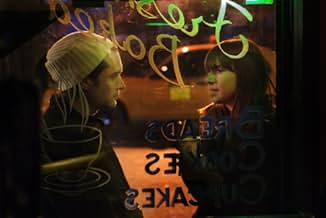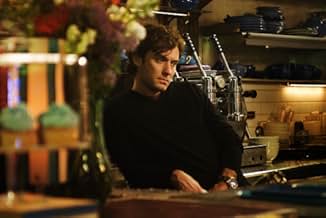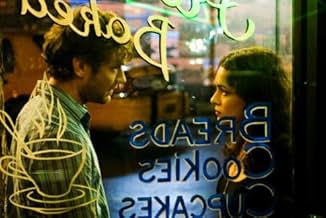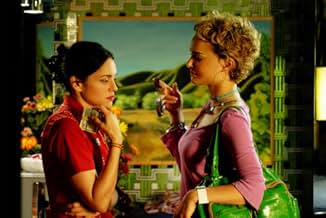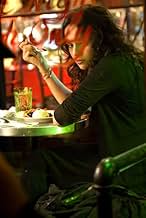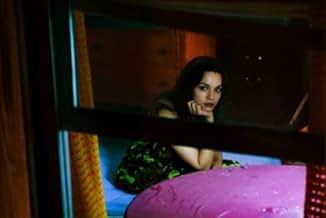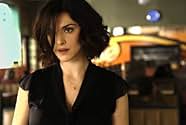IMDb-BEWERTUNG
6,6/10
57.988
IHRE BEWERTUNG
Eine junge einsame Frau unternimmt auf der Suche nach sich selbst und dem Mann, den sie liebt, eine Reise quer durch Amerika und trifft auf ihrem Weg verschiedene unkonventionelle Persönlich... Alles lesenEine junge einsame Frau unternimmt auf der Suche nach sich selbst und dem Mann, den sie liebt, eine Reise quer durch Amerika und trifft auf ihrem Weg verschiedene unkonventionelle Persönlichkeiten.Eine junge einsame Frau unternimmt auf der Suche nach sich selbst und dem Mann, den sie liebt, eine Reise quer durch Amerika und trifft auf ihrem Weg verschiedene unkonventionelle Persönlichkeiten.
- Auszeichnungen
- 5 Nominierungen insgesamt
Chad R. Davis
- Boyfriend
- (as Chad Davis)
Tracy Elizabeth Blackwell
- Matron
- (as Tracy Blackwell)
Empfohlene Bewertungen
Wong Kar Wai's English-language debut is a home run, thanks to his superior craft and thanks to the remarkable group of individuals he has brought together, from his star-studded cast to Ry Cooder on lead guitar and Darius Khondji as director of photography. Khondji is the lonesome lens man who made Pollack, Allen, Fincher, Boyle, Polanski, and Bertolucci look so fine, and he is at the top of his game as he makes Wong Kar Wai's trademark layered look shine like never before. Singer-songwriter Norah Jones' acting debut is impressive, as is Rachel Weisz' performance in the part of the Southern Belle, keeping the dialect coaches busy. Natalie Portman, cast against type, may be the prettiest face in Hollywood, but she tries very hard and, predictably, fails to come across as a trashy gambler. She even slips out of her fake accent twice: Once when she wakes up in bed with Norah Jones (understandable) and again when they split ("You're hopeless"). Similarly, Jude Law is unconvincing in the part of the philosophical bartender. I know everybody loves him, but I just don't see what they see. My money is on David Strathairn and his touching portrayal of Arnie, the quiet drunk. I wish they had kept his tab open a little longer and cut the lame Las Vegas leg of the script.
Wong is one of our three greatest living filmmakers.
He has transformed imagination for a planet. When real histories are written, artists like this will be appreciated for what they begin, giants compared to politicians who can only try to end things.
His last four films were transformative. Now he tries something outside his realm of mastery.
Like his main character, he has decided to travel the US in search of love. Also like his main character, he doesn't care about the story, only the afterglow. Its the mood that matters. In his previous films, he literally works without a script, creating an obvious vacuum where the story would be.
Here, he simply adopts a story that is so vacuous it leaves a similar hole. With a lesser artist, you would actually pay attention to the story and wonder about it. I suggest you simply ignore it, providing it with no more semiotic weight than the doorknobs which are so carefully photographed.
The idea here is simple: he finds a woman who by herself evokes a mood. He's done this before, and found creatures whose screen presence melts boundaries between stones allowing transparent slipperage. In this case, its Norah Jones, who does have a charm. His key image is of her drunk asleep on a diner counter with crumbs of delicious pastry on her full lips.
The way he's chosen to carry her image is through her songs, which contain a deceptive tension of confident tentativeness. This is a woman who is intensely unsettled and so is settled in herself. Jude Law plays a sort of urban domestic who prepares and waits, simply waits and draws her back.
In between the crumbs and the kiss are adventures with two women played by Rachel Weisz and Natalie Portman. They are placed as outer bounds on two sides so that our character's stone can slip home. One is remorsefully constrained by neediness, the other guiltily unconstrained. Both lose men, but not our heroine.
Christopher Doyle is not present on this, and its obvious that it is part of the risk Wong is taking: new country, new language, new mode for moodiness, new crew altogether. Different sorts of lingering and saturation.
Ted's Evaluation -- 3 of 3: Worth watching.
He has transformed imagination for a planet. When real histories are written, artists like this will be appreciated for what they begin, giants compared to politicians who can only try to end things.
His last four films were transformative. Now he tries something outside his realm of mastery.
Like his main character, he has decided to travel the US in search of love. Also like his main character, he doesn't care about the story, only the afterglow. Its the mood that matters. In his previous films, he literally works without a script, creating an obvious vacuum where the story would be.
Here, he simply adopts a story that is so vacuous it leaves a similar hole. With a lesser artist, you would actually pay attention to the story and wonder about it. I suggest you simply ignore it, providing it with no more semiotic weight than the doorknobs which are so carefully photographed.
The idea here is simple: he finds a woman who by herself evokes a mood. He's done this before, and found creatures whose screen presence melts boundaries between stones allowing transparent slipperage. In this case, its Norah Jones, who does have a charm. His key image is of her drunk asleep on a diner counter with crumbs of delicious pastry on her full lips.
The way he's chosen to carry her image is through her songs, which contain a deceptive tension of confident tentativeness. This is a woman who is intensely unsettled and so is settled in herself. Jude Law plays a sort of urban domestic who prepares and waits, simply waits and draws her back.
In between the crumbs and the kiss are adventures with two women played by Rachel Weisz and Natalie Portman. They are placed as outer bounds on two sides so that our character's stone can slip home. One is remorsefully constrained by neediness, the other guiltily unconstrained. Both lose men, but not our heroine.
Christopher Doyle is not present on this, and its obvious that it is part of the risk Wong is taking: new country, new language, new mode for moodiness, new crew altogether. Different sorts of lingering and saturation.
Ted's Evaluation -- 3 of 3: Worth watching.
Movie Review: My Blueberry Nights (2008) By Ken Lee
The filmic language of this film is unmistakably WKW, and it won't be wrong for one to say it's reminiscent of his earlier works, chief of which, "Chungking Express"; but it doesn't surpass past achievements, and does not bring us to the "next level", figuratively speaking.
A sentiment that may at once appears to be a bit too harsh, necessarily, this may be. But we do come to expect more from WKW, almost a master, in this age of ours.
Weak plot aside, this film benefits from some truly wonderful (supporting) casts throughout, especially from David Strathairn and Rachel Weisz, except for the most important - the ingénue character that Norah portrays. Symptomatic of this problem is, despite limited screen time together, one can't help wanting to find out more about the Katya character, who seems to share more on screen chemistry with Jeremy (Jude Law) in that cameo, and their past relationship seems a very promising spin-off, in its own right.
And if a post-modern pastiche can be made unto this film, imagine if it's the doll eye Faye Wong (of Chungking Express' fame) with Jude Law in this film...
Ten minutes into the film, when the "Yumeiji theme" (in harmonica) used so prevalently in "In the Mood for Love" was played in the background, I was almost teary eyes. This is one for WKW's fans, even if it's not for the ages.
The filmic language of this film is unmistakably WKW, and it won't be wrong for one to say it's reminiscent of his earlier works, chief of which, "Chungking Express"; but it doesn't surpass past achievements, and does not bring us to the "next level", figuratively speaking.
A sentiment that may at once appears to be a bit too harsh, necessarily, this may be. But we do come to expect more from WKW, almost a master, in this age of ours.
Weak plot aside, this film benefits from some truly wonderful (supporting) casts throughout, especially from David Strathairn and Rachel Weisz, except for the most important - the ingénue character that Norah portrays. Symptomatic of this problem is, despite limited screen time together, one can't help wanting to find out more about the Katya character, who seems to share more on screen chemistry with Jeremy (Jude Law) in that cameo, and their past relationship seems a very promising spin-off, in its own right.
And if a post-modern pastiche can be made unto this film, imagine if it's the doll eye Faye Wong (of Chungking Express' fame) with Jude Law in this film...
Ten minutes into the film, when the "Yumeiji theme" (in harmonica) used so prevalently in "In the Mood for Love" was played in the background, I was almost teary eyes. This is one for WKW's fans, even if it's not for the ages.
The film is all about mood. If you are not in it, you will not like the movie. My recommendation is to watch it at night, in bed, with no worries on your mind or things to do. It is not something really great, but it soothes the soul like one of those old road books.
The story itself is more of a three parter, each section detailing a mindset and the situations that define it. You see the hopeless romantic, the one person who let the other inside instead of just sticking to the outside, and for whom losing the other is worst than death; then there is the rebellious daughter that loves and hates her father until it's to late to do anything either way; and of course, the story of Nora Joneses and Jude Law's characters.
Bottom line: lay comfy in your bed and listen to the slow rhythms of the music while digesting the human nature presented in the film. In the end it is worth watching.
The story itself is more of a three parter, each section detailing a mindset and the situations that define it. You see the hopeless romantic, the one person who let the other inside instead of just sticking to the outside, and for whom losing the other is worst than death; then there is the rebellious daughter that loves and hates her father until it's to late to do anything either way; and of course, the story of Nora Joneses and Jude Law's characters.
Bottom line: lay comfy in your bed and listen to the slow rhythms of the music while digesting the human nature presented in the film. In the end it is worth watching.
This is a film of contrasts. A good story let down by poor dialogue; some great acting as well as some mediocre and good direction marred by irritating and indiscriminate "motion blur" filming.
The film has the elements and sometimes the feel of a charming love story, a modern-day fairy tale. The gentleness and innocence of the two main characters is in sharp contrast to the world inhabited by the secondary characters, where addiction to alcohol, gambling, desperation and suicide are the order of the day.
Jude Law as Jeremy seems to have lost the plot. His half-hearted attempts at a Manchester accent are woeful. Why bother with the accent anyway? He is a coffee shop owner in NY, and his origins have no bearing whatsoever on the storyline. However, his natural charisma and his gentle demeanour do suit the role, and he pairs well with Norah Jones as Elizabeth.
As for the flaws; is there ever total silence outside in the street in NY at night? And would customers really give their house keys to the person behind the counter in a coffee shop, to be kept in a glass jar? And would customers ever be known not by name, but by what they eat? And is there anyone in Manchester actually called Jeremy? As for Norah Jones, although she is on screen for most of the film, she does not have a lot to do or say which is just as well really. She spends most of her time watching in silent, doe-eyed admiration, as she is given a master class in acting by the "real" actors.
The *real" actors here are David Strathairn and Rachel Weisz. Strathairn gives a memorable, finely crafted performance as Arnie, who is a cop by day and an alcoholic barfly by night. Rachel Weisz as Sue Lynne his beautiful, wild, estranged wife makes full use of her short time on screen to create a wayward, tumultuous character at once sensuous, and sensitive. Between them they steal the show.
But gripes aside, the director does manage to create an appealing, if flawed, film. It's a mixed bag. It's good in parts.
The film has the elements and sometimes the feel of a charming love story, a modern-day fairy tale. The gentleness and innocence of the two main characters is in sharp contrast to the world inhabited by the secondary characters, where addiction to alcohol, gambling, desperation and suicide are the order of the day.
Jude Law as Jeremy seems to have lost the plot. His half-hearted attempts at a Manchester accent are woeful. Why bother with the accent anyway? He is a coffee shop owner in NY, and his origins have no bearing whatsoever on the storyline. However, his natural charisma and his gentle demeanour do suit the role, and he pairs well with Norah Jones as Elizabeth.
As for the flaws; is there ever total silence outside in the street in NY at night? And would customers really give their house keys to the person behind the counter in a coffee shop, to be kept in a glass jar? And would customers ever be known not by name, but by what they eat? And is there anyone in Manchester actually called Jeremy? As for Norah Jones, although she is on screen for most of the film, she does not have a lot to do or say which is just as well really. She spends most of her time watching in silent, doe-eyed admiration, as she is given a master class in acting by the "real" actors.
The *real" actors here are David Strathairn and Rachel Weisz. Strathairn gives a memorable, finely crafted performance as Arnie, who is a cop by day and an alcoholic barfly by night. Rachel Weisz as Sue Lynne his beautiful, wild, estranged wife makes full use of her short time on screen to create a wayward, tumultuous character at once sensuous, and sensitive. Between them they steal the show.
But gripes aside, the director does manage to create an appealing, if flawed, film. It's a mixed bag. It's good in parts.
Wusstest du schon
- WissenswertesThe name of the Jeremy's café "Klyuch" is actually the Russian word for key. It can be seen on the front door of the café in blue Cyrillic letters. Keys are an important plot point in the film because people leave them there often.
- PatzerWhen Elizabeth orders and eats steak at the café, her green knitted hat jumps higher up and lower down on her head multiple times between shots.
- Crazy CreditsThe opening credits play over melting ice cream drizzling over blueberry pie, while the font is blueberry colored.
- SoundtracksThe Story
Performed by Norah Jones
Written by Norah Jones
Courtesy of Blue Note Records
Published by Mutha Jones LLC / EMI Music Publishing
Top-Auswahl
Melde dich zum Bewerten an und greife auf die Watchlist für personalisierte Empfehlungen zu.
Details
- Erscheinungsdatum
- Herkunftsländer
- Offizieller Standort
- Sprache
- Auch bekannt als
- Say Tình
- Drehorte
- Produktionsfirmen
- Weitere beteiligte Unternehmen bei IMDbPro anzeigen
Box Office
- Budget
- 10.000.000 $ (geschätzt)
- Bruttoertrag in den USA und Kanada
- 867.275 $
- Eröffnungswochenende in den USA und in Kanada
- 74.146 $
- 6. Apr. 2008
- Weltweiter Bruttoertrag
- 22.007.671 $
- Laufzeit
- 1 Std. 35 Min.(95 min)
- Farbe
- Sound-Mix
- Seitenverhältnis
- 2.35 : 1
Zu dieser Seite beitragen
Bearbeitung vorschlagen oder fehlenden Inhalt hinzufügen


